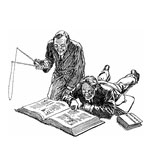
Do Historical Norms Alter Church Teachings? Should They?
ON "DOING" CATHOLIC THEOLOGY
“In the Anglophone world there is…a tendency for millennial generation students who survey the contemporary intellectual life of the Church and find it a mess to want to ‘reboot the system’ to 1961…. It [is] clear that even in 1961 there was no unified approach to the appropriation of medieval scholarship, although a unified approach was regarded as ideal.” — Tracey Rowland, Catholic Theology
“It has been a consistent Catholic teaching that all persons, of all classes, are born with a free will, and that the Divine distribution of grace, including the Gifts of the Holy Spirit, is not class dependent. A roll call of the martyred intellectuals and aristocrats who stood up to Adolf Hitler when the ‘people’ marched along to his tunes would provide ample counterexamples to the proposition that it is always the elite who have the oppressing ideas and the so-called ‘ordinary people’ who are reliable.” — Tracey Rowland, Catholic Theology
The question of what theologians “do” when they do what they claim to do has long been a topic of both controversy and amusement. Bloomsbury, a British publishing house, has been producing a series under its T&T Clark imprint on this very subject. Thus far, it has released six books in its “Doing Theology” series. Each treats the contemporary and historical theological concepts, controversies, and thinkers of a specific Christian tradition — Lutheran, Baptist, Methodist, Reformed, Anglican, and, finally, Catholic, with Tracey Rowland’s recent edition. Rowland, an Australian theologian, was an excellent choice to present and clarify the Catholic ways of “doing theology.”
Rowland has previously written two books on the thought of Pope Emeritus Benedict XVI and another on the understanding of culture in the documents of Vatican II. She studied at the University of Cambridge in England with the Radical Orthodox group that includes John Milbank and Catherine Pickstock. Rowland, who served as director of the John Paul II Institute in Melbourne, currently teaches theology at the University of Notre Dame Australia in Sydney. She holds two doctorates in theology and is a member of the International Theological Commission. This latter experience has provided her with an extraordinary number of direct dealings with contemporary Catholic theologians. The breadth of her reading and reflection is more than thorough.
“Doing Catholic theology” requires knowing with some accuracy what Catholics say they believe and why. Catholic theology claims to be a revelation that takes intelligence seriously. Indeed, Catholic theology maintains that its basic explanation of itself is, along with what reason can validly know, the truth of things. If it cannot stand this test of intelligence before reality, it cannot claim to be what it considers itself to be.
Rowland’s book is addressed to those who seek to work their way through what appears to be the maze, if not the chaos, of the differing views and opinions that arise in a Church that claims to speak the truth with a clear voice down the ages. That clarity, in the eyes of many, no longer appears obvious. Rowland writes in particular for those students, seminarians, clergy, academics, and interested laymen who are willing to devote the time and effort to understanding what is being argued and proposed in theological circles. We sense in her welcome book that what is at stake is the very possibility of a valid explication of both Catholicism and the world in a way that proves that they belong together without compromising any truth of thought or faith.
You May Also Enjoy
The hallmark of Catholic theology is that it insists on the concrete and resists the ethereal. Our beliefs are beliefs about reality.
The principal means of teaching in the medieval university was not the classroom lecture but the quaestio disputata (disputed question).
The scene: C.S. Lewis is sitting alone late at night at his big oak desk…

